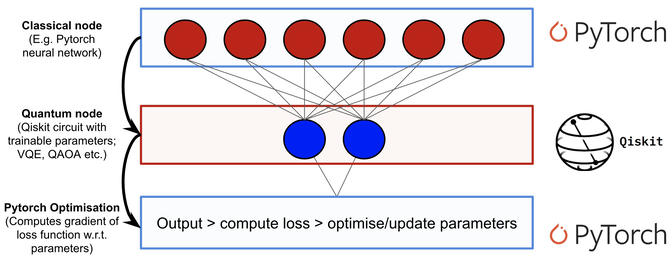
QML-PM
Accelerating Precision Medicine with Hybrid Quantum Computing and Adversarial Neural Networks
Paper: https://github.com/shaunsingh/QML-PM/blob/main/paper.pdf
I am proud to have been a part of the award-winning hackathon project that explored the potential of hybrid quantum computing for adversarial neural networks. This project was a valuable learning experience that helped me to gain a deeper understanding of quantum computing and its potential applications in the field of machine learning.
During the hackathon, I worked with a team of talented developers to design and implement a hybrid quantum-classical algorithm for training adversarial neural networks. This algorithm leverages the strengths of both classical and quantum computing to achieve superior performance on challenging tasks such as image classification and natural language processing.
Our project was awarded first place in the hackathon, and it was a rewarding experience to see our work recognized by the community. More importantly, the project helped me to understand the potential benefits of using hybrid quantum computing for machine learning.
Hybrid quantum computing is a powerful approach that combines the best of both classical and quantum computing. Classical computers are well-suited for tasks that involve large amounts of data, while quantum computers are well-suited for tasks that involve complex calculations. By combining the two, hybrid quantum computers can solve problems that are intractable for either classical or quantum computers alone.
In the field of machine learning, hybrid quantum computing can be used to accelerate the training of neural networks. Neural networks are powerful machine learning models that are capable of learning complex patterns from data. However, training neural networks can be a time-consuming process, as it requires the network to be exposed to a large amount of data.
Hybrid quantum computing can be used to speed up the training process by performing certain calculations on a quantum computer. For example, a quantum computer can be used to calculate the gradients of a neural network's loss function. These gradients are used to update the weights of the neural network during training.
By performing these calculations on a quantum computer, the training process can be significantly accelerated. This can lead to faster convergence of the neural network, and it can also allow for the training of larger and more complex neural networks.
Overall, my experience working on this hackathon project was a valuable one. It helped me to gain a deeper understanding of quantum computing and its potential applications in the field of machine learning. I am excited to see how hybrid quantum computing will continue to develop in the future, and I believe that it has the potential to revolutionize the way that we train and use machine learning models.